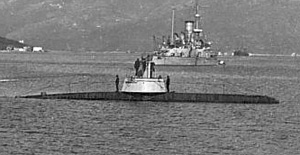
Back غواصة يو بي-10 Arabic اسام یوبی-۱۰ Persian Unterseeboot UB-10 French SM UB-10 Polish UB-10号潜艇 Chinese
 UB-10 was identical in design to UB-15 (shown here in service as the Austro-Hungarian U-11)
| |
| History | |
|---|---|
| Name | UB-10 |
| Ordered | 15 October 1914[1] |
| Builder | AG Weser, Bremen[2] |
| Yard number | 219[1] |
| Laid down | 7 November 1914[1] |
| Launched | 20 February 1915[1] |
| Commissioned | 15 March 1915[1] |
| Decommissioned | 12 September 1918[3] |
| Fate | Scuttled off Flanders on 5 October 1918[1] |
| General characteristics [4] | |
| Class and type | Type UB I submarine |
| Displacement | |
| Length | 27.88 m (91 ft 6 in) (o/a) |
| Beam | 3.15 m (10 ft 4 in) |
| Draft | 3.03 m (9 ft 11 in) |
| Propulsion |
|
| Speed |
|
| Range |
|
| Test depth | 50 metres (160 ft) |
| Complement | 14 |
| Armament |
|
| Notes | 33-second diving time |
| Service record | |
| Part of: |
|
| Commanders: |
|
| Operations: | 115 patrols[1] |
| Victories: | |
SM UB-10 was a German Type UB I submarine or U-boat in the German Imperial Navy (German: Kaiserliche Marine) during World War I.
UB-10 was ordered in October 1914 and was laid down at the AG Weser shipyard in Bremen in November. UB-10 was a little under 28 metres (92 ft) in length and displaced between 127 and 141 t (125 and 139 long tons), depending on whether surfaced or submerged. She carried two torpedoes for her two bow torpedo tubes and was also armed with a deck-mounted machine gun. UB-10 was broken into sections and shipped by rail to Antwerp for reassembly. She was launched in February 1915 and commissioned as SM UB-10 in March.[Note 1] The U-boat was the first of her class to commence operations when she entered service on 27 March 1915.
UB-10 was the first boat assigned to the Flanders Flotilla, the unit in which she spent her entire career. Her first two commanders were Otto Steinbrinck and Reinhold Saltzwedel, fifth and eleventh, respectively, among the top-scoring German submarine commanders of the war. UB-10 was credited with sinking 37 ships, about two-thirds of them British fishing vessels. The first ship sunk, the neutral Dutch steamer Katwijk, provoked outrage in the Netherlands and helped turn Dutch public opinion against Germany. That sinking was also the impetus behind a renewed effort to avoid attacking neutral ships by U-boats. In a 13-day span in July and August 1915, UB-10 sank 23 ships, and by herself accounted for nearly all of the tonnage sunk by the Flanders Flotilla in the latter month. She was also responsible for sinking the British destroyer HMS Lassoo in August 1916. UB-10 had two close calls with British submarines near the Schouwen Bank off Zeebrugge in 1916 and 1917, but survived both.
By 1918, UB-10 had been converted into a minelayer by the replacement of her torpedo tubes with four mine chutes. UB-10 was seriously damaged in a British air raid on Flanders in July 1918, and was decommissioned in September 1918 in a worn out condition. She was not deemed seaworthy to sail to Germany when the bases in Flanders were being evacuated by the Germans in October 1918 and was scuttled off Zeebrugge in early October.
Cite error: There are <ref group=Note> tags on this page, but the references will not show without a {{reflist|group=Note}} template (see the help page).